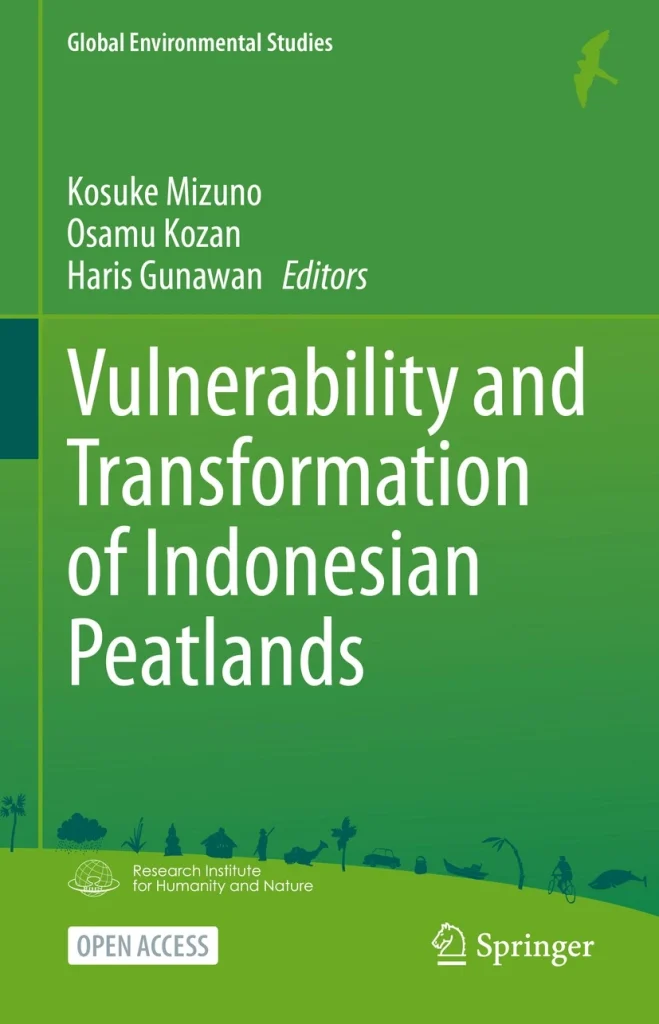From the Editors
This book is the first volume of a four-volume series that presents the research outcomes from the Research Institute for Humanity and Nature practical project ‘Toward the Regeneration of Tropical Peatland Societies: Building International Research Network on Paludiculture and Sustainable Peatland Management.’
This open access book deals with restoring degraded peatlands to help mitigate global warming, to which SDG 15 and SDG 13 are directly related. The book analyzes peatland degradation and restoration of the Indonesian peatland ecosystem through the integrated lens of resilience, vulnerability, adaptation, and transformation. We shed light on what constitutes “resilience” of the peat swamp forest, digs deeper into local knowledge in developing the studies on institutions, governance, and ecological conditions that support the resilience of the peat swamp forest to elaborate on the idea of transformation in today’s degraded peatlands.
We consider peat swamp forests to be resilient and examine the mechanisms of their resilience from ecological and sociological perspectives. However, they are vulnerable to development involving drainage, such as large-scale plantations, and require scientific knowledge to rehabilitate. In the current critical situation on peatlands, it is necessary to learn from past lessons and further reconstruct the knowledge acquired from scientific findings on the ecology, biology, and soil science of peat swamp forests, as well as people’s efforts to control fires and attempts at new paludiculture (farming under wetland conditions), in order to restore degraded peatlands and maintain the ecosystems.
The book analyzes restoration efforts through rewetting, revegetation, and rehabilitation of the local livelihoods with the concepts of adaptation and transformation. The integrated analysis covers fieldwork of more than a decade and various aspects such as agrarian and social changes, biological changes (birds, mammals, and termites), carbon emission, water control, timber use, revegetation efforts, and the Indonesia Sustainable Palm Oil (ISPO) program implementation. It also employs the ideas of vulnerability, resilience, adaptability, and transformation based on expanded studies on peatlands and observations of and participation in multiple efforts to prevent fires and restore the degraded peatland by researchers, the government, non-government organizations (NGOs), private companies, and last but not least, the local people. The discussion includes the period of pre-degradation and several efforts at peatland restoration for a better understanding and analysis of the long-term peatland dynamics. (Kosuke Mizuno and Osamu Kozan)
Contents
- Introduction: The Vulnerability and Transformation of Indonesian Peatlands
Kosuke Mizuno, Motoko S. Fujita, Osamu Kozan, Masayuki Itoh, Satomi Shiodera, Daisuke Naito et al.
Vulnerability of Peat Swamp Forest
- Peatland Degradation, Timber Plantations, and Land Titles in Sumatra
Kosuke Mizuno, Kazuya Masuda, Almasdi Syahza - Characteristics of Bird Community Response to Land Use Change in Tropical Peatland in Riau, Indonesia
Motoko S. Fujita, Hiromitsu Samejima, Dendy Sukma Haryadi, Ahmad Muhammad - Impact of Industrial Tree Plantation on Ground-Dwelling Mammals and Birds in a Peat Swamp Forest in Sumatra
Hiromitsu Samejima, Motoko S. Fujita, Ahmad Muhammad - Patterns of CO2 Emission from a Drained Peatland in Kampar Peninsula, Riau Province, Indonesia
Satyanto Krido Saptomo, Budi Indra Setiawan, Yudi Chadirin, Kazutoshi Osawa, Toshihide Nagano, Kosuke Mizuno et al.
Resilience and Adaptability of Peat Swamp Forest
- Termite: Friend or Foe? Conservation Values of Termites in Tropical Peat Systems
Kok-Boon Neoh, Ahmad Muhammad, Masayuki Itoh, Osamu Kozan - The Timber Processing and Retail Sectors in Pekanbaru, Riau: Toward Reforestation by Local People
Haruka Suzuki - Toward Climate Change Mitigation: Restoration of the Indonesian Peat Swamp
Haris Gunawan, Dede Hendry Tryanto, Kosuke Mizuno, Osamu Kozan
Transformation
- Water Management for Integrated Peatland Restoration in Pulau Tebing Tinggi PHU, Riau
Sigit Sutikno, Rinaldi, Muhamad Yusa, Besri Nasrul, Yesi, Chairul et al. - Genetic Diversity in Peatland Restoration: A Case of Jelutung
Hesti Lestari Tata - Interests Arrangement in the Implementation of Indonesian Sustainable Palm Oil Certification: Case Study of Sari Makmur Palm Oil Smallholders in Riau Province
Bondan Widyatmoko
